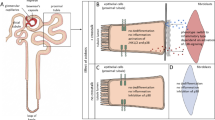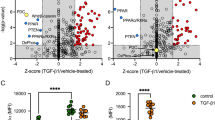Abstract
Background
In diabetic nephropathy, tubulointerstitial fibrosis is an important component of renal injury. Transforming growth factor (TGF)-β is a key cytokine that is involved in the pathogenesis of tubulointerstitial fibrosis. However, signal transduction cascades of TGF-β under high-glucose conditions remain to be clarified. We undertook this study to elucidate whether mitogen-activated protein (MAP) kinase and Smad proteins were involved in TGF-β-induced fibronectin (FN) production under high glucose in NRK fibroblasts.
Methods
After serum restriction, NRK cells were exposed to either normal glucose (5.5 mM d-glucose), high glucose (30 mM d-glucose), or 30 mM l-glucose in the presence or absence of TGF-β for 24 h. MAP kinase inhibitors (SB 203580 and PD 98059) were added to the cultured NRK fibroblasts 2 h before TGF-β1, and the incubations continued for 8 h. The phosphorylation of p38 MAP kinase, extracellular signal-regulated kinase (ERK)1/ERK2, and c-Jun N-amino terminal kinase (JNK) was assessed by immunoblotting. Reverse transcription-polymerase chain reaction (RT-PCR) and Western blotting were performed to determine FN mRNA and protein expression, respectively.
Results
High glucose significantly increased the expression of FN mRNA, by 2.4 ± 1.4-fold. In the presence of either SB 203580 or PD 98059, the high glucose-induced FN mRNA increase was completely inhibited. Incubation of NRK fibroblasts for 48 h in 30 mM d-glucose did not alter p38 MAP kinase, ERK1/ERK2, or JNK phosphorylation. The addition of exogenous TGF-β1 (1 ng/ml) for 8 h increased FN mRNA by 2.7 ± 1.1-fold. Both the TGF-β1- and high glucose-induced FN mRNA increases were inhibited by SB 203580 and PD 98059. Dominant-negative Smad4 did not affect the FN mRNA increase induced by TGF-β1 and high glucose. Exogenous TGF-β1 under both normal and high glucose, enhanced the phosphorylation of both p38 MAP kinase and ERK1/ERK2, but not that of JNK.
Conclusions
NRK fibroblasts exposed to high glucose demonstrated increased TGF-β1-induced p38 MAP kinase activation. The FN synthesis induced by high glucose and TGF-β1 was not affected by the Smads pathway and was not due to increased osmolarity. The enhanced activation of p38 MAP kinase may contribute to the altered fibroblast phenotype that leads to progressive diabetic nephropathy.
Similar content being viewed by others
Author information
Authors and Affiliations
Corresponding author
About this article
Cite this article
Suzuki, H., Uchida, K., Nitta, K. et al. Role of mitogen-activated protein kinase in the regulation of transforming growth factor-β-induced fibronectin accumulation in cultured renal interstitial fibroblasts. Clin Exp Nephrol 8, 188–195 (2004). https://doi.org/10.1007/s10157-004-0297-8
Received:
Accepted:
Issue Date:
DOI: https://doi.org/10.1007/s10157-004-0297-8




